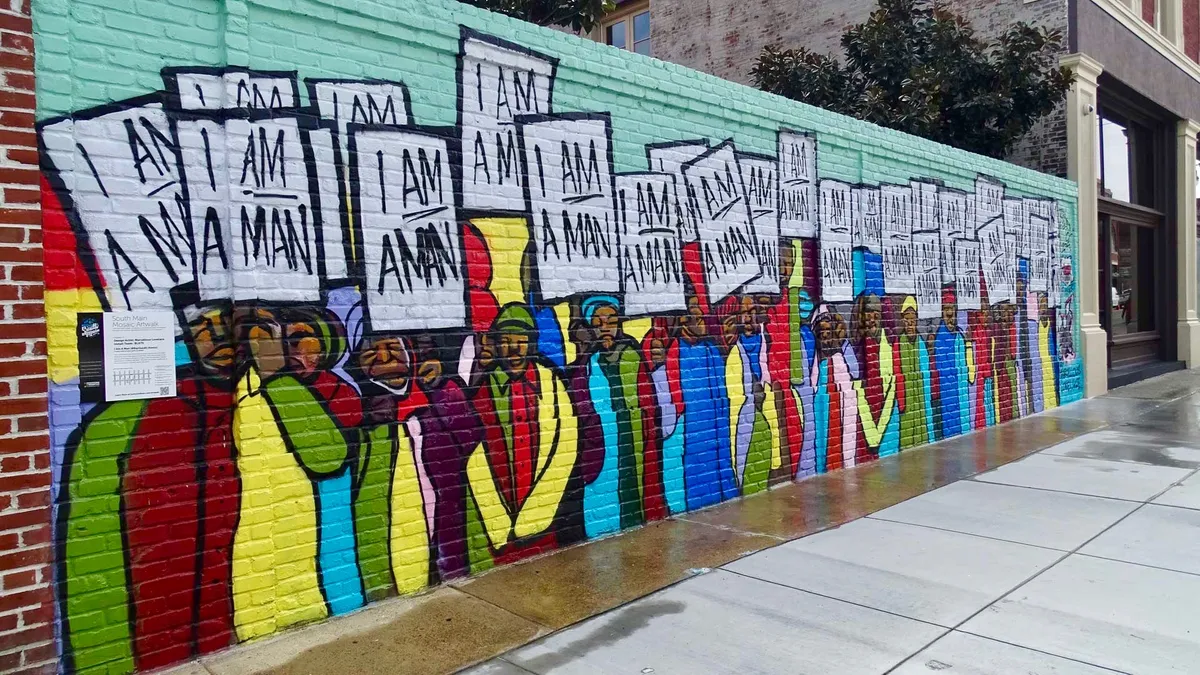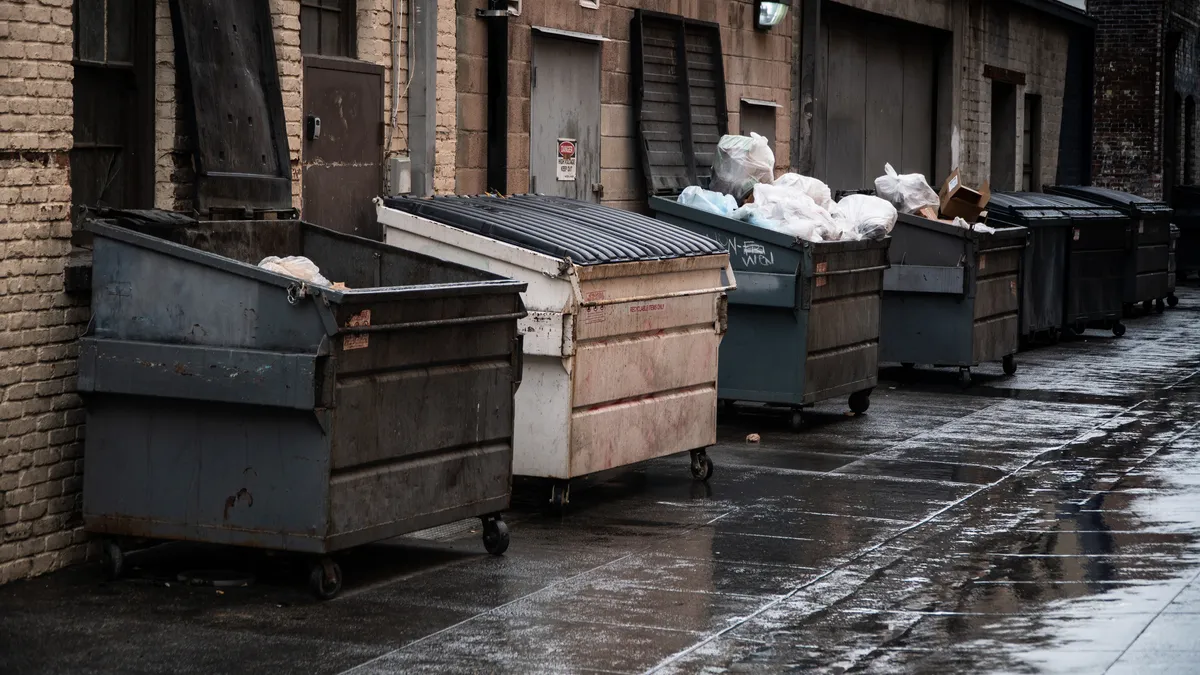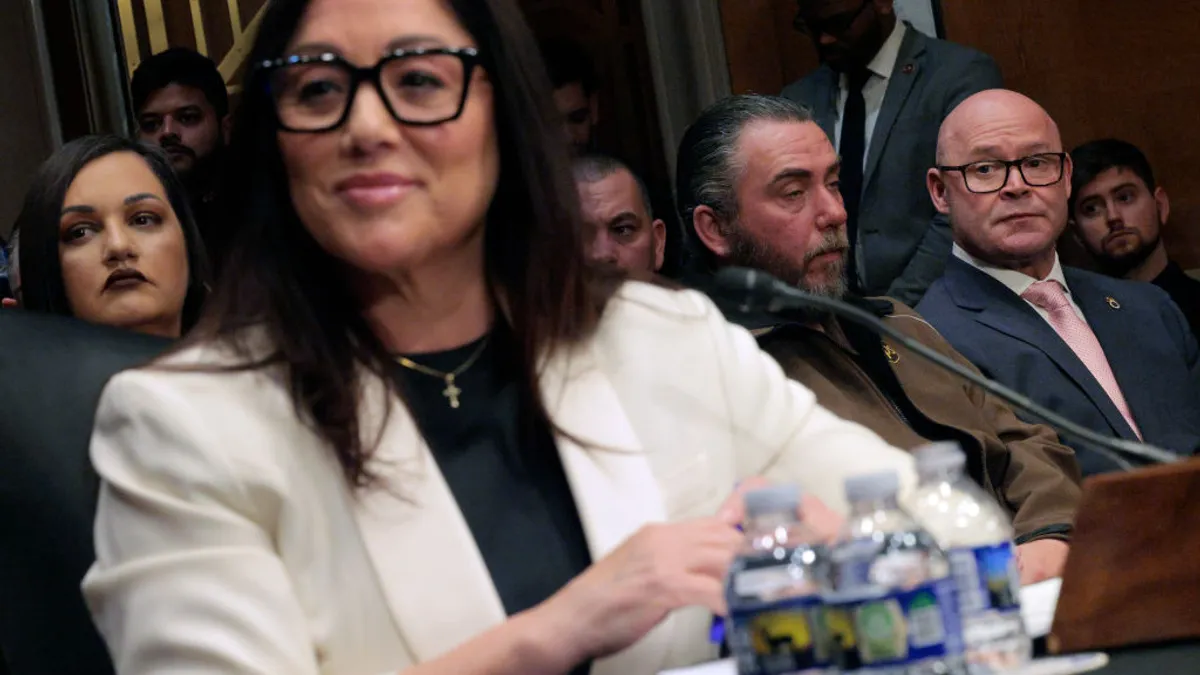Welcome to Scrap Collector, Waste Dive's Friday round-up of insights and stories you may have missed during the week.
THE LIVING LEGACY OF THE MEMPHIS SANITATION STRIKE
"I AM A MAN," the signs read. These days, the words are iconic; in 1968, they were a grasp at long-denied dignity, an urgent and exhausted exhortation to a city that had rendered its black sanitation workers faceless, voiceless, powerless.
In a 2018 piece for Smithsonian Magazine, Ted Conover described the daily conditions endured by the Memphis workers as "legendary": "Sanitation workers, treated like casual laborers who had to show up whether there was work or not, dragged 55-gallon drums or carried open tubs of garbage to the truck. The Number 3 tubs would often leak onto their shoulders [...] The workers had no uniforms and no place to wash up after work."
Or, as put more succinctly by former Memphis City Council Member Fred Davis, "When a kid wanted to put somebody down, they'd refer to their daddy being a sanitation worker."
While the 1968 strike eventually resulted in tangible changes within the sanitation department, the strikers themselves never reaped the full benefits. Rather than participating in the city’s pension plan, they opted instead for Social Security — a decision that bore harsh and enduring financial consequences.
Then, in July 2017, Memphis moved to make amends via tax-free grants of $70,000 each (initially $50,000) to 14 surviving strikers, several of whom were still working for the city's public works department — an effort to "do the right thing by these men who sacrificed so much on the mission that brought Dr. Martin Luther King Jr. to our city in 1968," wrote Mayor Jim Strickland in a Medium post.
More former strikers have since stepped forward. As reported by FOX13, Memphis leaders announced this week that they're seeking approval for payments to three new potential recipients. Assuming they meet certain qualifications — participation in the strike, at least 25 years of service and completion of educational counseling — the surviving participants will likely be given $70,000 each.
Some wonder, of course, whether $70,000 is adequate compensation for over five decades of systemic racism and entrenched poverty — whether there is, in fact, any dollar amount that could represent true redress. With former Sanitation Salvage employees organizing this past Monday in New York to protest unpaid back wages — and fatality rates for collection workers standing at 10 times the national average — it's clear the ethos of the 1968 strike abides. And with that, I'll leave you with these words from Dr. King, spoken in Memphis on the eve of his assassination:
Nothing would be more tragic than to stop at this point, in Memphis. We've got to see it through. And when we have our march, you need to be there. Be concerned about your brother. You may not be on strike. But either we go up together, or we go down together.
IN OTHER NEWS...
The Ocean Cleanup could wipe out more than just marine litter, says marine biologist — The Atlantic
It turns out the Ocean Cleanup’s ongoing technical difficulties may be a blessing in disguise. According to marine biologist Rebecca Helm, the initiative's plastic catcher — previously hailed by UN Environment as "revolutionary" — could bring about the destruction of an entire ecosystem living at the ocean’s surface. The neuston, Helm writes, is home to a strange, breathtaking array of organisms: "There are sea anemones, barnacles, copepods, color-changing crabs, specialized bacteria, even bugs, all living in this inverted reef in the middle of the open ocean."
But this "alien world, as bizarre as it is beautiful," could very well be annihilated if the Ocean Cleanup proves successful. According to Helm, the Ocean Cleanup's environmental-impact assessment glaringly omits any mention of the neuston; however, based on a previous study, she was able to determine that one of these neuston ecosystems is in the precise location the Ocean Cleanup eventually plans to operate in, and where it's currently testing out its garbage catcher prototype.
Taking into account the project's ultimate aim to reduce ocean plastic by at least 90% by 2040, it's easy to work out the logical, devastating conclusion: "Neuston and plastic co-occur: They're in the exact same spots. Cleaning up 90 percent of the plastic using the current method means potentially destroying 90 percent of the neuston."
Study confirms waste collection work is literally back-breaking — Institution of Occupational Safety and Health (IOSH)
According to a new paper published in IOSH’s Policy and Practice in Health and Safety Journal, waste collection systems in the UK could be contributing to musculoskeletal disorders (MSDs) — any injury, damage or disorder of tissues in the limbs or the back — among workers.
The study, which was conducted by researchers at the University of Greenwich and Glasgow Caledonian University, showed that "box type" collections (manual handling of boxes and baskets of waste) are associated with higher instances of MSDs than wheeled bin-based collection services. Less pain and decreased MSD risk were also reported when workers were able to undergo job rotation and task variation.
"The findings of this research present a timely opportunity for organisations to consider how they protect their workforces,” said Dr. David Thomas, a member of IOSH’s Environmental and Waste Management Group Committee. "Rather than organisations focusing on generic 'capability' for a 'fit youngster' they need to consider how they accommodate an ever-increasing ageing workforce when developing systems of work."
AROUND THE WORLD
Malaysia cracking down on illegal plastic waste factories — Malay Mail
Yeo Bee Yin, Malaysia's environment minister, isn't playing. Since stepping into the role last July, she's implemented single-use plastic bans, pushed successfully to phase in a permanent block of plastic waste imports, shut down more than 50 illegal importers and castigated first-world nations for making Malaysia "the dumpsite for the developed world."
And she's only getting started. Yeo announced last week that the government intends to shutter up to 100 illegal plastic waste factories nationwide in the first quarter of 2019 — apparently leading one such raid herself.
"I want to make it clear that we will no longer tolerate such illegal entities from operating as they used to," Yeo told the press during the raid. "Therefore, I encourage the public to act as our eyes and ears, and alert us to any instances of illegal plastic waste recycling factories that they come across so we can swiftly deal with them."
China announces creation of "waste-free cities" — Reuters
While some have questioned whether China can subsist on its own resources after curtailing imports, the country's latest green initiative signals an ongoing commitment to expanding its domestic recycling infrastructure. In an effort to combat the environmental challenges posed by growing amounts of urban trash, China's environment ministry announced Wednesday the launch of a pilot program to create "waste-free cities." Designed to encourage green development methods and lifestyles, the 10 cities selected for the first phase will have, among other features, enhanced solid waste sorting, urban planning improvements and new treatment facilities.
SEEN & HEARD
History. #Berkeley passes the most ambitious, groundbreaking policy to reduce throw-away foodware in the nation. Thank you to the @EcologyCenter, @SophieHahnBerk, various stakeholders, and the community for providing input on this landmark legislation. #berkmtg
— Jesse Arreguin (@JesseArreguin) January 23, 2019
I've mulled the same question. What I fear is that bags lead to straws lead to receipts ... lead to the next niche ban that requires near zero consumer sacrifice. My fear is that that incrementalism leads to the belief that incremental change is sufficient.
— Adam Minter (@AdamMinter) January 21, 2019























